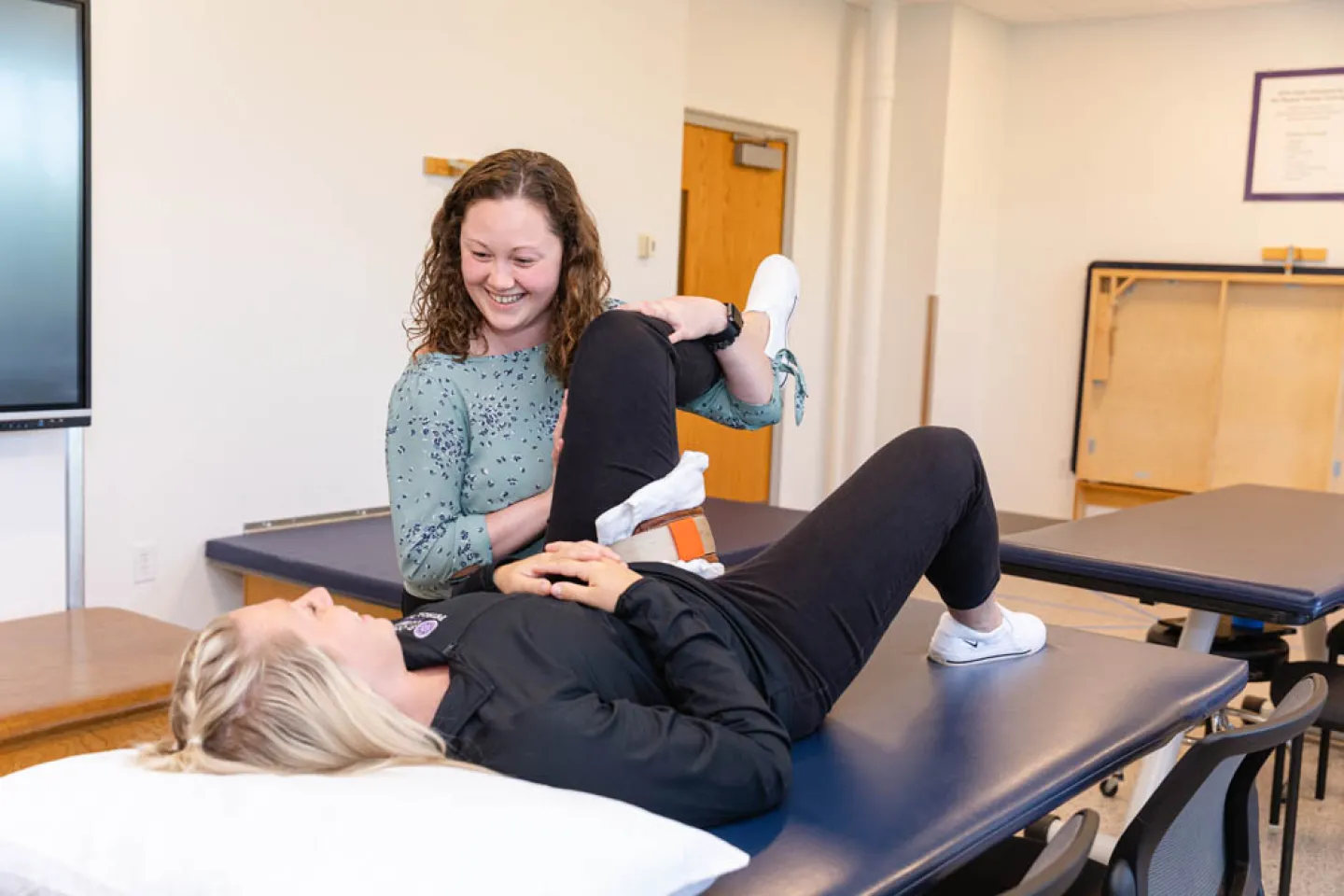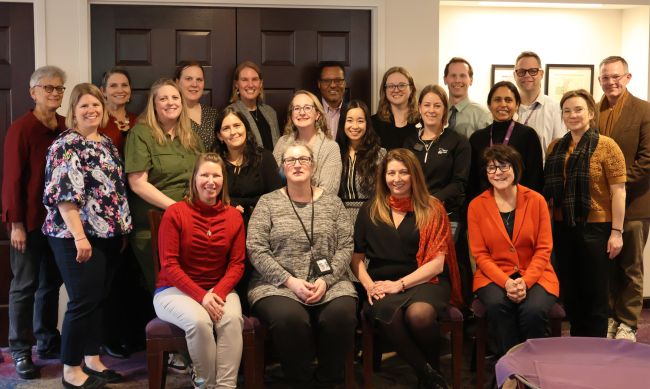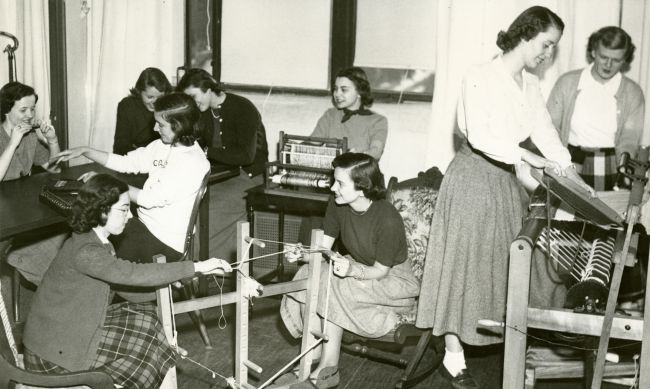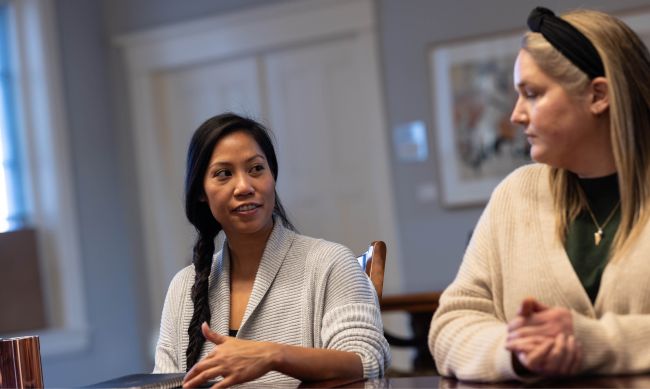Master of Arts in Occupational Therapy (MAOT) Bridge Program

Master of Arts in Occupational Therapy (MAOT) Bridge Program
Take the Next Step in becoming an OT.
Hybrid format bridge program for current OTA professionals to become a licensed OT.
Advance your career with an Occupational Therapy Master's Degree
With over 80 years as an educational leader in OT, St. Kate’s OT Bridge Program is designed for practicing Occupational Therapy Assistants to build upon their existing knowledge and experience. Our program focuses on busy, working professionals looking to take the next step in their careers and open the door to new opportunities.
Our 56-credit program is different from other OT Bridge Programs
The flexible, hybrid format requires only one in-person lab per semester for the first three semesters, allowing students to continue their personal commitments while completing their degree in less time, lessening the financial burden.
As an OTA coming into our program with previous education in occupational therapy language, clinical observations, therapeutic use of self, and occupational therapy treatment, our curriculum is designed to focus on the educational gap between the two practitioner levels-OTA to OTR, and targets the core competencies needed to pass the NBCOT exam.
The St. Kate’s MAOT Bridge program will help you:
- Advance your leadership and advocacy skills
- Advocate for social justice and our profession
- Understand how to read and apply research for evidence-based practice
- Prepare to pass NBCOT Occupational Therapy exam
The curriculum is offered in a weekday format with on-campus classes and extensive fieldwork. The program is open to students of all genders.
NBCOT Certification Exam
Graduates of the MAOT Bridge Program will be eligible to sit for the national certification examination*. The National Board for Certification in Occupational Therapy (NBCOT) conducts a national certification program.
*The MAOT Bridge Program must receive ACOTE accreditation for students to sit for the NBCOT exam.
Program at a Glance
Format: Hybrid
Start: Fall, Spring
Time to completion:
2.5 calendar years (104 instructional weeks)
6 semesters (+24 weeks of fieldwork)
Credits required: 56 credits (which includes 24 weeks of fieldwork)
Tuition per credit: $995 (2025-26 rates)
Total tuition: $55,720
Rates are subject to change each June 1.
Degree questions, answered.
Below are sample plans of study. For course descriptions and other details, consult the University catalog.
Fall Semester 1
- Foundations (2cr)
- Bridging the Gap: Evolving from OTA to OT (3cr)
- Neuroscience (3cr)
- OT Process: Evaluation of Older Adult Population (with Lab*) (4cr)
- Child Development (2cr)
Total Semester 1 Credits: 14
Spring Semester 2
- Mental Health and Wellness Across the Lifespan (3cr)
- Evidenced Based Practice (3cr)
- OT Process: Evaluation of Adult Population (with Lab*) (4cr)
- Kinesiology and Human Movement (with Lab) (3cr)
- Fall Start: Hand therapy (1cr)
Total Semester 2 Credits: 14
Summer Semester 3
- Leadership, Management & Advocacy (3cr)
- Research (3cr)
- Assistive Technology (3cr)
- OT Process: Evaluation of Pediatric Population (with Lab *) (4cr)
- Fall Start: Program Development (3cr)
Total Semester 3 Credits: 16
Fall Semester 4
- Level II Fieldwork A (5cr)
- Level II Fieldwork Seminar A (1cr)
Total Semester 4 Credits: 6
Spring Semester 5
- Level II Fieldwork B (5cr)
- Level II Fieldwork Seminar B (1cr)
Total Semester 5 Credits: 6
Total Program Credits: 56
*Lab requires on-site weekend
Spring Semester 1
- Foundations (3cr)
- Bridging the Gap: Evolving from OTA to OT (1cr)
- Neuroscience
- OT Process: Evaluation of Older Adult Population (with Lab*)
- Child Development
Total Semester 1 Credits: 14
Summer Semester 2
- Mental Health and Wellness Across the Lifespan (3cr)
- Evidenced Based Practice (3cr)
- OT Process: Evaluation of Adult Population (with Lab*) (4cr)
- Kinesiology and Human Movement (with Lab) (3cr)
- Spring Start: Program Development
Total Semester 3 Credits: 16
Fall Semester 3
- Leadership, Management & Advocacy (3cr)
- Research (3cr)
- Assistive Technology (3cr)
- OT Process: Evaluation of Pediatric Population (with Lab *) (4cr)
- Spring Start: Hand therapy (1cr)
Total Semester 3 Credits: 14
Spring Semester 4
- Level II Fieldwork A (5cr)
- Level II Fieldwork Seminar A (1cr)
Total semester credits: 6
Summer Semester 5
- Level II Fieldwork B (5cr)
- Level II Fieldwork Seminar B (1cr)
Total semester credits: 6
Total Program Credits: 56
*Lab requires on-site weekend
Apply
Identify what you need to start your application.
Learn More
Financial Aid
How to finance your education.
Learn More
Information Session
Ask questions, meet faculty, and more.
Learn More
Tuition Rates
Review costs and payment processes.
Learn More
St. Kate's Experience
Discover a supportive community invested in more than your academic success — we help you connect with your purpose. Our goal is to help each of our students develop the knowledge and empowerment to transcend what they thought was possible.
Accreditation
The entry-level occupational therapy master’s degree program has applied for accreditation by the Accreditation Council for Occupational Therapy Education (ACOTE) of the American Occupational Therapy Association (AOTA), located at 7501 Wisconsin Avenue, Suite 510E, Bethesda, MD 20814. ACOTE’s telephone number c/o AOTA is (301) 652-AOTA and its web address is www.acoteonline.org. The program must be granted Candidacy Status, have a preaccreditation review, complete an on-site evaluation, and be granted Accreditation Status before its graduates will be eligible to sit for the national certification examination for the occupational therapist administered by the National Board for Certification in Occupational Therapy (NBCOT). After successful completion of this exam, the individual will be an Occupational Therapist, Registered (OTR). In addition, all states require licensure to practice; however, state licenses are usually based on the results of the NBCOT Certification Examination. A felony conviction may affect a graduate’s ability to sit for the NBCOT certification examination or attain state licensure. For more information, contact ACOTE at: Accreditation Council for Occupational Therapy Education (ACOTE)
Students must complete 24 weeks of Level II fieldwork within 18 months following completion of the didactic portion of the program.








